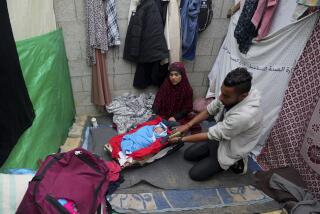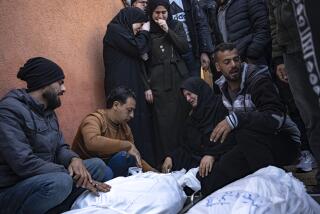New Fighting Shatters Truce in Croatia : Yugoslavia: But republic leaders claim progress toward a diplomatic solution. Gorbachev invites warring rivals to talks in Moscow.
- Share via
ZAGREB, Croatia — Fighting ripped through eastern Croatia again Thursday, killing at least nine people and shattering another cease-fire in Yugoslavia’s virulent ethnic war.
A shaky peace had been maintained in the secessionist republic for two days, and there was a claim from republic leaders negotiating in The Hague that they would resolve the crisis through diplomacy within a month.
But with eight broken agreements in their wake and casualties and resentment mounting by the hour, prospects for easing Serb-Croat hostility seemed ever more remote.
In a sign of increasing international concern over the deadly conflict, Soviet President Mikhail S. Gorbachev has invited the leaders of both Serbia and Croatia for peace talks in Moscow, the Yugoslav news agency Tanjug reported.
The Serbian-led federal army attacked the towns of Vukovar and Vinkovci, in eastern Croatia, just before a European Community convoy was to bring food and medicine into the region that has been the scene of recurring bloodshed since early August.
Croatian Radio said the army advanced with tanks and artillery, while Serbia’s Radio Belgrade accused Croatian national guardsmen of provoking the army with sniper fire.
Nine were killed and at least 32 wounded in the battles, Tanjug reported.
Mortar barrages also erupted in Osijek, Pakrac and Nova Gradiska, according to both Serbian and Croatian media.
Even before the latest outbreaks of violence, neither side had taken any significant steps to clear land and naval blockades, as agreed under a truce worked out Tuesday by EC mediators. Thursday’s renewed fighting angered the foreign intermediaries, who charged the combatants with a lack of goodwill.
“Two days have already passed, and we are disappointed with the fact that neither of the sides has lifted the blockades or ceased fire or done anything to cease hostilities,” said Simon Smits, spokesman for the 200-member EC delegation sent in to monitor the first truce, declared on July 8. That first accord succeeded in halting violence in neighboring Slovenia, which along with Croatia declared independence from Yugoslavia on June 25.
But the army, whose officers corps is 70% Serbian and loyal to the disintegrating federation that justified its existence, has pressed ahead with a deadly offensive in Croatia, seizing nearly half the republic’s territory.
Serbia, Yugoslavia’s largest republic, is staunchly opposed to Croatian independence because of the 600,000 ethnic Serbs who live in Croatia. Serbs fear that an ultra-nationalist leadership would gain power and massacre the Serbian minority, as occurred in 1941 when a Nazi puppet regime declared an independent Croatia. Croats insist those fears are expressed to mask what they say is the army’s true goal of building a Greater Serbia by seizing as much former Yugoslav territory as possible.
Johan Kosters, deputy chief of the EC delegation, told reporters that the army was moving in fresh troops and equipment from Serbia. Although the cease-fire agreement announced late Tuesday did not specifically prohibit army reinforcements, the EC monitors point to such deliberate violations of the agreement’s spirit as evidence that neither side is committed to peace.
Kosters denounced the army for attacking Vukovar and criticized Croatia for its refusal to pull back forces barricading federal troops and tanks at the Borongaj garrison, just outside Zagreb. “If we go on this way, there is no use to go on meeting or for us to stay in Yugoslavia,” warned Smits, the EC mission spokesman.
While the EC team has been unable to enforce a lasting peace between the bitter ethnic rivals, its withdrawal would remove the only deterrent to an all-out bloodletting.
Meantime, at talks in The Hague under the auspices of the Dutch chairman of the 12-nation EC, there were new claims of a possible diplomatic resolution to the crisis. Dutch Foreign Minister Hans van den Broek said Serbian President Slobodan Milosevic, Croatian President Franjo Tudjman and federal Defense Minister Veljko Kadijevic agreed to work toward a political settlement within a month.
More to Read
Sign up for Essential California
The most important California stories and recommendations in your inbox every morning.
You may occasionally receive promotional content from the Los Angeles Times.













